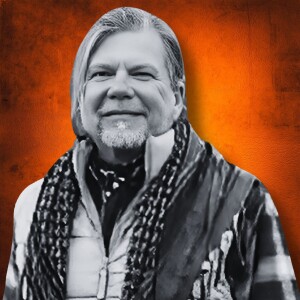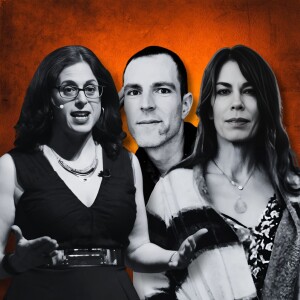Men’s Therapy Podcast
This is the ultimate podcast for men. The most pressing topics relating to men, covered in one podcast by Marc Azoulay, a psychotherapist with over a decade of experience. Using Neuroscience, Jungian Psychology, and Buddhist Philosophy, we explore, Men’s Mental Health Modern Masculinity, Authentic Leadership, and Shadow Work.
Welcome to “Men’s Therapy Podcast” where we tackle essential questions like “How can I be a good man?” “What do leaders need to succeed?” “How do we break childhood wounding and generational trauma?” We also cover addiction recovery, mindfulness, coparenting strategies, spiritual development and more! Whether you’re seeking to understand emotional intelligence for leaders, improve executive functioning, or incorporate mindfulness into daily life, this podcast is for you.
Join us as we uncover how childhood conditioning impacts our actions and discover pathways to self-improvement and personal development.
Tune in to the Men’s Therapy Podcast and start your journey towards becoming a better father, leader, husband, and man today!
Episodes

Monday Aug 04, 2025
Monday Aug 04, 2025
In this episode of the Men’s Therapy Podcast, Marc Azoulay welcomes coaching psychologist and author James Davis. He unpacks one of the most under-discussed phases of a man’s life: the midlife crisis. Davis specializes in hormone health and andropause (commonly referred to as “male menopause”). He offers much-needed insight into the challenges that men experience from their 40s onward.
“The average 20-year-old guy today has lower testosterone than a 50-year-old did in the 1980s,” Davis reveals. He highlights the alarming trends in declining hormone levels. He explains that what many men mistakenly believe is aging or burnout might stem from a hormone imbalance. “We’re talking low libido, lack of focus, and just feeling like everything’s a chore.”
Davis is helping men recognize that a midlife crisis isn’t just emotional—it’s also deeply rooted in biology. “There’s a lot of shame and confusion. Guys don’t talk about it. But low testosterone isn’t about weakness—it’s about awareness,” he adds.
For more podcasts, blogs, and to get involved in the Men's Therapy Online Community, visit www.menstherapy.online.
Follow us on social media: https://mtr.bio/mens-therapy-online.

Monday Jul 28, 2025
Monday Jul 28, 2025
On this episode of the Men’s Therapy Podcast, we have two licensed therapists. Jack Lambert is a New York-based mental health counsellor. And Tim Mullins is a Colorado-based licensed professional counsellor. They discuss the rising demand for teen therapy. The conversation focuses on the communication challenges parents face. It highlights how Gen Z boys are navigating gender identity. It also sheds light on the crucial need for affirming therapy as boys shape their understanding of modern masculinity.
Jack brings years of experience working with college-aged young men. He notes, “I hear a lot of students saying, ‘I don’t even think my parents are going to be open to me going to therapy. I’m scared they’ll see it on the insurance.’” It’s a fear rooted in misunderstanding, stigma, and an ongoing generational divide.
Tim echoes these concerns. He adds, “Teenagers are struggling to express themselves in a rapidly evolving digital world. Their primary support system, ‘parents’, is often disconnected from what teens are experiencing.” They emphasize the importance of opening up nonjudgmental communication channels between parents and teenagers. Especially during times of teenage anxiety and identity exploration.
As we explore the nuanced psychological, social, and emotional dimensions of raising Gen Z, one thing becomes clear. Today's teens need therapy not because they're weak, but because the pressures of growing up in 2025 are unlike anything seen before.
For more podcasts, blogs, and to get involved in the Men's Therapy Online Community, visit www.menstherapy.online.
Follow us on social media: https://mtr.bio/mens-therapy-online.

Monday Jul 21, 2025
Monday Jul 21, 2025
Micah Blackwell is the host of Men’s Couch podcast. He is a student at Robert Morris University. Micah is stepping into the spotlight for a reason that hits close to home. Like many young men today, he’s navigating the complicated terrain of identity and emotional growth. “I was struggling with depression, OCD, and anxiety by the time I was 16,” Micah shares. “I realized that therapy wasn’t just for a crisis. It was essential for my overall well-being.”
Micah’s story begins, like many others, in the middle of personal struggle. However, what sets him apart is his dedication to creating a space where other young men can feel safe, seen, and supported. His podcast, Men’s Couch, is born from his therapeutic journey and a desire to promote Gen Z mental health in ways that challenge outdated norms.
“Vulnerability became the core value of my show,” he explains. “I wanted to break the image that men always have to have it all figured out.” What’s compelling is that Micah is not just speaking to his peers—he’s speaking from within them. Micah’s insights offer a rare and timely look into how young men are redefining modern masculinity from the inside out.
For more podcasts, blogs, and to get involved in the Men's Therapy Online Community, visit www.menstherapy.online.
Follow us on social media: https://mtr.bio/mens-therapy-online.

Thursday Jul 17, 2025
Thursday Jul 17, 2025
“You didn’t run a marathon. You didn’t build a company. You didn’t even leave your bed today. So why are you so mentally and physically drained?”
With this provocative question, Marc Azoulay opens a deeply revealing solo episode focused on the hidden causes of brain fog in Gen Z men. Azoulay unpacks a generation that’s paradoxically overwhelmed, not from doing too much, but from doing almost nothing at all.
“These guys aren’t lazy,” Marc explains. “They’re burnt out from doing absolutely nothing—and that’s a different kind of exhaustion.” The episode paints a vivid picture of a generation caught in the grip of digital burnout. Marc highlights battling screen addiction and struggling with motivation issues. Despite being more emotionally aware than generations before.
He shares that Gen Z men regularly experience dopamine fatigue, low drive, and a loss of meaning. They’re spending hours in front of screens—scrolling TikTok, switching between games and social media. They are engaging in short-form content that constantly shifts their attention. “It’s not relaxing,” Marc says. “It’s incredibly draining.”
For more podcasts, blogs, and to get involved in the Men's Therapy Online Community, visit www.menstherapy.online.
Follow us on social media: https://mtr.bio/mens-therapy-online.

Monday Jul 14, 2025
Monday Jul 14, 2025
Piers Cross is no stranger to the silent damage that elite education can leave behind. He is a leadership coach, author, and documentarian. Cross talks about a deeply personal and widely underexplored topic—generational trauma. Especially one that stems from boarding school syndrome.
In his poignant documentary Boarding on Insanity, Cross sheds light on this emotional trauma. He highlights the structural neglect embedded within boarding school systems. "My father went to boarding school, my godfather went, my uncle went—it was just the done thing," he shares. At age 11, he follows in their footsteps. What begins as an exciting adventure quickly devolves into a harsh reality when his mother fails to pick him up for leave day. "Suddenly, I realized I couldn’t go home anymore," he recalls.
That realization triggers a painful emotional spiral that Cross buries for years. The culture of stoicism at school teaches boys to suppress emotions, especially grief. "I remember crying one night and the whole dormitory came in laughing, shouting, ‘You're not so cool, Cross.’ I made a decision that night to never cry again." That internalized vow carries forward into adulthood. This contributes to what he later recognizes as a complete emotional shutdown. It is a pattern common among men dealing with childhood neglect and toxic resilience.
For more podcasts, blogs, and to get involved in the Men's Therapy Online Community, visit www.menstherapy.online.
Follow us on social media: https://mtr.bio/mens-therapy-online.

Thursday Jul 10, 2025
Thursday Jul 10, 2025
In this compelling solo episode of the Men’s Therapy Podcast, host Marc Azoulay confronts a growing crisis—mobile addiction. He sheds light on its psychological grip on Gen Z and men in general. Azoulay lays bare the harsh realities of dopamine flooding. He highlights how it is training male brains to be “more anxious, less focused, and emotionally numb.”
Azoulay centres much of the conversation around Jonathan Haidt’s book The Anxious Generation. It explores the disturbing correlation between smartphone use and rising mental health issues in young men. He highlights how these devices—originally meant as tools—have subtly evolved into emotional crutches. They have become relationship substitutes and even addiction gateways.
“You don’t even realize it,” Azoulay notes, “but every scroll, every like, every swipe is rewiring your brain.”
Marc maps out the symptoms of phone dependence. He reveals a sobering truth — from phantom vibrations and increased anxiety in silence to a breakdown in focus. “If you can’t read a chapter in a book or focus on a single conversation,” he warns, “your brain may already be caught in an addictive loop.”
But all is not lost. Azoulay offers hope in the form of a dopamine detox. It is a structured break from excessive digital stimulation. It has proven to recalibrate the mind, reduce stress, and reignite creativity. This detox isn’t about demonizing technology; it's about reclaiming control.
For more podcasts, blogs, and to get involved in the Men's Therapy Online Community, visit www.menstherapy.online.
Follow us on social media: https://mtr.bio/mens-therapy-online.

Monday Jul 07, 2025
Monday Jul 07, 2025
In this powerful episode of the Men’s Therapy Podcast, host Marc Azoulay welcomes Vince Chafin. He is a men’s work facilitator and a motivational speaker. He is a longtime contributor to transformational organizations like the Mankind Project and Sacred Sons. Vince is not just a seasoned practitioner; he’s a man who has lived the journey he now guides others through.
Vince has navigated the pain of multiple failed marriages and personal breakdowns. He shares his raw and vulnerable story of how he finds healing through men’s work. “I had been operating with some old operating systems,” he explains, “trying to make those work in the outside world. And those weren’t working.” It’s only when he discovers the New Warrior Training Adventure from the Mankind Project that everything begins to shift.
What follows is a 14-year deep dive into weekly men’s circles, emotional discipline, and the resurrection of a kind of grounded masculinity often lost in today’s world. “It didn’t solve all my problems,” Vince admits, “but it opened some new doors, new possibilities.” Vince is learning to rebuild what many modern men have been missing—true, integrated masculine energy.
For more podcasts, blogs, and to get involved in the Men's Therapy Online Community, visit www.menstherapy.online.
Follow us on social media: https://mtr.bio/mens-therapy-online.

Monday Jun 30, 2025
Monday Jun 30, 2025
In a special roundtable episode of the Men’s Therapy Podcast, host Marc Azoulay brings together three leading voices in men’s mental health. They discuss one of the most personal and transformative experiences men face: divorce. Relationship coach Shana James, couples therapist Tamra Sattler, and somatic psychotherapist Silvan Erb-Summers join the discussion. This episode explores the heart of emotional healing, identity crisis, and what it means to be a man after separation.
As Shana reflects, “Divorce is one of the most amazing catalysts for evolution. It is an opportunity to be loved for who you are instead of who you thought you were when you were a lot younger.” Her message is clear—this painful transition can also be a path to profound self-awareness and connection.
Tamra emphasizes the emotional whiplash many men face. “These men have been building their careers for 20 years, and suddenly it’s time to discuss a relationship. Know yourself. Be yourself. Embody yourself.” Silvan, a child of divorce himself, adds a layer of intergenerational insight. “It’s cool to see how many more resources there are now… divorce dads are starved for support.”
Together, these experts guide listeners through the confusion and grief that accompany divorce. They also spotlight the tools and community needed to rebuild.
For more podcasts, blogs, and to get involved in the Men's Therapy Online Community, visit www.menstherapy.online.
Follow us on social media: https://mtr.bio/mens-therapy-online.

Saturday Jun 28, 2025
Saturday Jun 28, 2025
In this solo episode of the Men’s Therapy Podcast, therapist and host Marc Azoulay takes centre stage. He shares what he calls the “Divorce Comeback Blueprint.” He has years of experience working with men. Marc outlines the deeply personal and often painful road that men walk after a failed marriage. Marc invites his listeners into a process of transformation. It is a way to reclaim identity, rebuild purpose, and redefine masculinity.
“This isn’t the end. In fact, for many men, it’s a starting line,” Marc says, reframing divorce as an opportunity for growth rather than a life sentence. He observes that many men don’t begin their emotional work until they hit rock bottom. Divorce often acts as that trigger. Through honest reflection and tactical advice, Marc encourages men to embrace grief. He focuses on them to take ownership of their role in the relationship and begin a structured comeback plan.
Drawing from real-life therapy experiences, Marc emphasizes the deep emotional collapse men often endure: “It’s not that you’re a loser… It’s grief.” He urges his audience to step away from the toxic masculinity that teaches men to repress emotions. Instead of moving toward post-divorce therapy, community, and intentional healing. His roadmap isn’t a quick fix—it’s a life redesign.
For more podcasts, blogs, and to get involved in the Men's Therapy Online Community, visit www.menstherapy.online.
Follow us on social media: https://mtr.bio/mens-therapy-online.

Thursday Jun 26, 2025
Thursday Jun 26, 2025
In this solo episode of the Men’s Therapy Podcast, therapist and host Marc Azoulay offers exposes the divorce industry. He shares a deep, sobering look into the dark underbelly of the family law system. Marc draws on his experience working with men in the aftermath of divorce. He unveils the layers of trauma, manipulation, and systemic bias men face as they navigate custody battles. He shares the emotional abuse and the overwhelming financial burden of the divorce industry.
“Divorce isn’t just emotionally painful—it’s weaponized, monetized, and systematized,” Marc explains. “Men are often the ones paying the price—financially, emotionally, and psychologically.”
This isn’t just a critique of lawyers or court procedures—it’s an urgent conversation about an industry that profits from emotional turmoil. The average contested divorce can cost $15,000–$30,000 per person, and that's before child support or alimony is even considered. For many men, this becomes the start of a long road filled with unresolved grief, identity loss, and shattered relationships.
Marc shares alarming statistics: mothers receive primary custody in 80% of U.S. divorces. 97% of alimony awards are paid by men—figures that reveal a deeply ingrained systemic bias. The episode is both a reality check and a call to arms for men to reclaim their narrative. It highlights how to build strong support systems. It focuses on prioritizing emotional healing through post-divorce therapy and community care.
For more podcasts, blogs, and to get involved in the Men's Therapy Online Community, visit www.menstherapy.online.
Follow us on social media: https://mtr.bio/mens-therapy-online.








